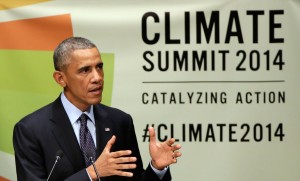
After years of debating its true extent and relevance, it now seems the issue of climate change is finally being taken seriously. At last week’s United Nations Summit on Climate Change, presidents, prime ministers and diplomats met to discuss what steps needed to be taken to address the ever-growing issue of global warming.
Following the summit, the U.N. pledged to cut deforestation in half by 2020 and end it completely by the following decade. This measure aimed to reverse some of deforestation’s negative effects by protecting natural forests, as well as replanting trees in areas that had been widely affected while also providing financial incentives to areas that reduce their deforestation. By converting carbon dioxide into oxygen, forests play an integral role in limiting greenhouse gases and creating breathable air. According to UN.org, if the plans work as expected, the initiative would avoid between 4.5 and 8.8 billion tons of carbon dioxide each year by 2030 — equivalent to removing one billion cars off the road.
These actions come after several worldwide protests put pressure on leaders to produce concrete plans of action. This included the massive People’s Climate March in New York City, where according to USA TODAY, an estimated 300,000 participants dominated Manhattan in support of climate reform. Akili King, a 19-year old Chicago native, said she attended the event because, “It made me very hopeful of there being a change in our government’s view on climate change. It’s important that my children grow up breathing clean air, swimming in clean water, and knowing the animals we all grew up knowing. I just feel like it’s our right as humans.”
It doesn’t take much of a critical examination to notice the striking weather patterns that have characterized the world the past few years. Critical storms, such as this year’s Hurricane Sandy, are feeling more like an annual occurrence, while India and Pakistan continue to struggle to rebuild what remains after a season of ongoing monsoons. And no one can forget last winter’s “Chiberia,” where low temperatures in the Midwest frequently surpassed those recorded in the South Pole. While there is strong disagreement on whether these events can be directly linked to climate change caused by humans, wild weather patterns make this issue virtually impossible to ignore. The concept of climate change has left the world of the theoretical, and graduated to the point where it is literally slapping us in the face.
While many groups continued to argue that climate change is completely fabricated, the facts and the masses seem to agree that something has to be done to stop the rapid pace at which the world’s weather patterns are changing, and fast. However, the most pressing question is not whether climate change is real, but rather, will the solutions proposed by local and international governments be enough to stop its escalation before it’s too late? The U.N. Summit appeared to be a step in the right direction by putting pressure on governments to make it happen.


JFC / Oct 6, 2014 at 10:17 pm
With 60 BILLION food animals on the planet, this should be our first step in the Climate March! The best chance to mitigate climate change is to severely reduce consumption of animal foods. More than 1/3 of human induced warming is attributable to animal agriculture. Methane is 24 times more potent than CO2 but takes only 7 years to cycle out of the atmosphere. CO2 takes around 100 years to come out. Human pursuit of animal protein is the leading cause of methane release and a primary cause of CO2 concentrating in the atmosphere. Check the facts and act!
Methane vs. Carbon Dioxide: A Greenhouse Gas Showdown
http://tinyurl.com/kwnwz6n
“As environmental science has advanced, it has become apparent that the human appetite for animal flesh is a driving force behind virtually every major category of environmental damage now threatening the human future: deforestation, erosion, fresh water scarcity, air and water pollution, climate change, biodiversity loss, social injustice, the destabilization of communities, and the spread of disease.” Worldwatch Institute, “Is Meat Sustainable?”
“If every American skipped one meal of chicken per week and substituted vegetables and grains… the carbon dioxide savings would be the same as taking more than half a million cars off of U.S. roads.” Environmental Defense Fund
“A 1% reduction in world-wide meat intake has the same benefit as a three trillion-dollar investment in solar energy.” ~ Chris Mentzel, CEO of Clean Energy
Step by Step Guide: How to Transition to a Vegan Diet http://www.onegreenplanet.org/vegan-food/step-by-step-guide-how-to-transition-to-vegan-diet/